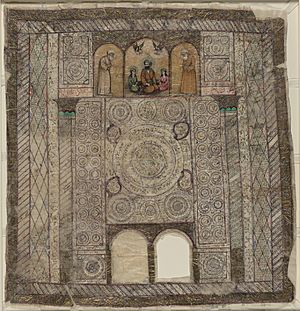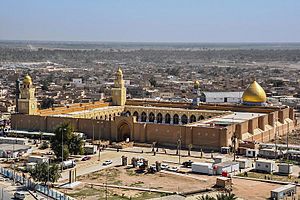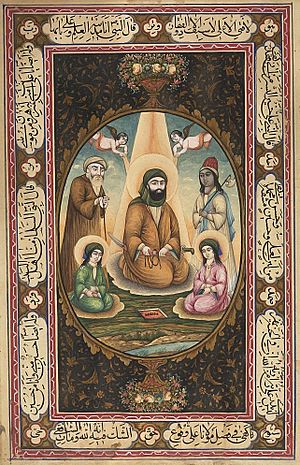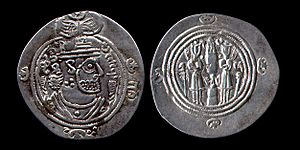Hasan ibn Ali facts for kids
Quick facts for kids Hasan ibn Aliالحسن بن علي |
|
|---|---|
|
|
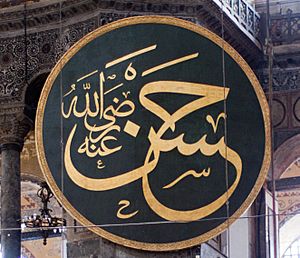
Calligraphic seal featuring Hasan's name, on display in the Hagia Sophia
|
|
| Caliph | |
| Reign | January 661 – August 661 |
| Predecessor | Ali ibn Abi Talib |
| Successor | Mu'awiya I |
| 2nd Shia Imam | |
| Tenure | 661–670 |
| Predecessor | Ali ibn Abi Talib |
| Successor | Husayn ibn Ali |
| Born | c. 625 Medina, Hejaz, Arabia |
| Died | 2 April 670 (aged 44) Medina, Umayyad Caliphate |
| Burial | Al-Baqi Cemetery, Medina |
| Spouse |
|
| Issue |
|
| Tribe | Quraysh (Banu Hashim) |
| Father | Ali ibn Abi Talib |
| Mother | Fatima bint Muhammad |
| Religion | Islam |
Hasan ibn Ali (Arabic: الحسن بن علي, romanized: Al-Ḥasan ibn ʿAlī; c. 625 – 2 April 670) was an important figure in early Islamic history. He was the oldest son of Ali and Fatima, and a grandson of the Islamic prophet Muhammad. Hasan briefly served as the 5th Rashidun caliph from January to August 661. He then signed a peace treaty with Mu'awiya and stepped down. Mu'awiya became the first ruler of the Umayyad dynasty. Hasan is seen as the second Imam in Shia Islam, following Ali and before his brother Husayn. As a grandson of the prophet, he was part of Muhammad's family, known as the ahl al-bayt and the ahl al-kisa. He also took part in the event of Mubahala.
During the time Ali was caliph (656-661), Hasan joined him in battles during the First Muslim Civil War. After Ali was killed in 661, people in Kufa recognized Hasan as the new caliph. However, Mu'awiya I, the governor of Syria, did not accept Hasan's rule. Mu'awiya led an army towards Kufa and asked Hasan to step down. Hasan sent an army group ahead, led by Ubayd Allah ibn Abbas, to stop Mu'awiya. Meanwhile, Hasan was badly hurt in an attack by the Kharijites, a group against both Ali and Mu'awiya. This attack made Hasan's army lose hope, and many soldiers left. Ubayd Allah and most of his troops also left after Mu'awiya offered them money. In August 661, Hasan signed a peace treaty with Mu'awiya. The treaty said that Mu'awiya must rule according to the Quran and the sunna (Prophet's teachings). It also stated that a council should choose Mu'awiya's successor, and Hasan's supporters would be safe. Hasan then left politics and lived in Medina. He died there, possibly from illness or poisoning. Many early sources agree he was poisoned. Mu'awiya is often thought to have been behind Hasan's death. This cleared the way for Mu'awiya's son Yazid to become the next ruler.
Some people criticized Hasan's treaty with Mu'awiya, calling it a sign of weakness. They said he wanted to give up from the start. However, Hasan's supporters argue that giving up was necessary because Mu'awiya's army was stronger and Hasan's soldiers had rebelled. They believe Hasan wanted peace and unity among Muslims. This was reportedly predicted by Muhammad in a Sunni hadith (saying). Another Sunni hadith said that the prophetic rule would last for thirty years. Some early Sunni scholars saw Hasan's caliphate as part of this "rightly-guided" period. In Shia belief, Hasan is the second Shia Imam and is considered perfect. This justified his actions. Shias believe Hasan's authority came from God. This authority was not lost when he stepped down from political power. Shias see the Imamate (spiritual leadership) and Caliphate (political rule) as separate until God makes the Imam victorious.
Contents
Early Life of Hasan
Birth and Family
Hasan was born in Medina around 625 CE. Sources differ on the exact month, but many say it was 15 Ramadan 3 AH (March 2, 625 CE). Shias celebrate this date every year. Hasan was the first child of Muhammad's daughter Fatima and his cousin Ali. Their marriage is very important to Muslims. Muhammad reportedly said he married Fatima to Ali because God ordered it. Ali had chosen another name for his son, but Muhammad named him Hasan, which means "good" or "virtuous." To celebrate his birth, Muhammad sacrificed a ram. Fatima shaved Hasan's head and gave silver equal to the weight of his hair to charity.
Growing Up with Muhammad
Hasan grew up in Muhammad's home until he was about seven years old, when his grandfather died. Many early stories show Muhammad's deep love for Hasan and his brother Husayn. Muhammad would let the boys climb on his back during prayer. He even stopped a sermon once to pick Hasan up after he fell. Hasan later remembered that his grandfather took a date from him. Muhammad explained that his family was not allowed to receive charity.
A hadith in a Sunni collection says that Hasan and Husayn are the "chiefs" of the youth in paradise. This hadith is widely known. Another hadith says, "He who has loved Hasan and Husayn has loved me and he who has hated them has hated me." Another saying from Muhammad states, "Whoever loves me and loves these two [Hasan and Husayn] and loves their mother and father [Fatima and Ali], will be with me on the Day of Resurrection."
The Mubahala Event
In 631-632 CE, Muhammad and the Christians of Najran had a debate that didn't end clearly. They decided to do something called mubuhala. This meant both sides would pray to God to curse the one who was lying. Muhammad took Hasan, Husayn, and their parents, Ali and Fatima, with him to this event. This is the Shia view, and some Sunni historians agree.
During the event, Muhammad gathered Hasan, Husayn, Ali, and Fatima under his cloak. He called them his ahl al-bayt (family). This is mentioned in both Shia and Sunni sources. Their involvement in this important event likely raised the religious status of Muhammad's family.
Muhammad and Fatima's Deaths
Muhammad died in 632 CE when Hasan was about seven. While Muhammad's family prepared for his burial, a group of Muslims met and chose Abu Bakr as Muhammad's successor. Ali, Fatima, and some supporters did not accept Abu Bakr's rule. They believed Muhammad had chosen Ali as his successor.
Fatima also died in 632 CE, within six months of Muhammad's death. This was a very sad time for young Hasan.
Hasan's Role in the Caliphate
Under Early Caliphs
Hasan did not play a big role during the rule of the first three caliphs: Abu Bakr (632-634), Umar (634-644), and Uthman (644-656). He might have received money from Umar's state pension system. Some reports say Hasan joined an expedition to Amol during Umar's rule, but this is debated.
Hasan joined his father Ali in saying goodbye to Abu Dharr al-Ghifari, who was sent away from Medina. Abu Dharr had spoken out against the powerful.
In June 656, Uthman was surrounded in his home by rebels. Hasan and Husayn were likely hurt while guarding Uthman's house for Ali. Many reports say Hasan was among the defenders. However, on the last day, Hasan and most guards reportedly put down their weapons at Uthman's request. Another report says Hasan arrived just in time to identify Uthman's killers. Hasan later criticized Ali for not doing enough to protect Uthman.
During Ali's Caliphate
Ali became caliph after Uthman was killed. Soon after, Ali faced a rebellion led by Aisha, Muhammad's widow, and two companions, Talha and Zubayr. Hasan and Ammar ibn Yasir were sent to Kufa to gather support. They raised an army of about 6,000 men. Hasan also helped remove the governor of Kufa, who was hindering Ali's efforts. Hasan later fought in the Battle of the Camel (656) against Aisha, Talha, and Zubayr.
Hasan also fought against Mu'awiya I in the Battle of Siffin (657). Some sources say he was not a major participant. Others say Hasan criticized Ali's war policy, saying it caused division. However, other accounts list Hasan as a commander at Siffin. One Shia source says Mu'awiya tried to get Hasan to switch sides, but Hasan refused. Hasan also convinced some neutral figures to support Ali at Siffin. He strongly opposed the peace talks after Siffin, just like his father. In November 658, Ali put Hasan in charge of his land properties.
Hasan Becomes Caliph
In January 661, Ali was killed by a Kharijite named Abd al-Rahman ibn Muljam. Hasan was then recognized as caliph in Kufa, which was Ali's capital. Ali had not clearly named a successor before he died suddenly. However, he often said that only members of Muhammad's family (ahl al-bayt) should be caliphs. As Ali's chosen heir, Hasan was the clear choice for caliph. Some Shia reports add that Ali also gave Hasan his authority to command and to punish his killer. Muhammad's surviving companions were mostly in Ali's army. They likely pledged loyalty to Hasan, as there are no reports saying otherwise.
In his first speech at the Great Mosque of Kufa, Hasan praised the ahl al-bayt. He quoted a verse from the Quran (42:23).
Ali's commander, Qays ibn Sa'd, was the first to pledge his loyalty to Hasan. Qays swore an oath based on the Quran and the Prophet's teachings. Hasan, however, avoided a condition about fighting those who made lawful what was unlawful. Hasan probably worried about the support of the people of Kufa. The oath said people should "make war on those who were at war with Hasan, and should live in peace with those who were at peace with him." This condition surprised people, who thought he might make peace with Mu'awiya. However, this oath was the same as one Ali had demanded earlier.
Conflict with Mu'awiya
Mu'awiya had been at war with Ali. He did not accept Hasan as caliph and prepared for war. He marched an army of sixty thousand men towards Maskin, near present-day Baghdad. At the same time, Mu'awiya sent letters to Hasan, asking him to give up his claim to the caliphate. Mu'awiya might have hoped to force Hasan to step down. He may have also wanted to attack the Iraqi forces before they were ready. Mu'awiya might have believed that Hasan would remain a threat even if he was defeated. If Hasan stepped down for Mu'awiya, such claims would become meaningless.
Their letters discussed who should succeed Muhammad. Hasan urged Mu'awiya to pledge loyalty to him. He used the same arguments Ali had used against Abu Bakr. Ali had said that if the Quraysh tribe could claim leadership because Muhammad was from them, then Muhammad's own family was the most qualified. Mu'awiya replied that Muslims knew the importance of the ahl al-bayt. But they had chosen Abu Bakr to keep the caliphate within the Quraysh. Hasan also wrote that Mu'awiya had no real religious merit. He was the son of Muhammad's enemy, Abu Sufyan. Mu'awiya replied that he was better suited to be caliph because he was older, had more experience governing, and had a stronger army. This suggested that these qualities were more important than religious standing. Mu'awiya's response showed a separation between politics and religion. This idea later became a key part of Sunni Islam. In contrast, Shia Islam believes all authority belongs to Muhammad's family.
Mobilizing Troops and Mutiny
When Hasan heard about Mu'awiya's advance, he ordered his governors to prepare for war. He asked the people of Kufa to get ready to fight. He reminded them that God had made fighting a duty. At first, there was no response. This might have been because Mu'awiya had bribed some tribal leaders. Hasan's companions then encouraged the crowd, and many joined the army camps. Hasan soon joined them. He appointed Ubayd Allah ibn Abbas to lead a group of twelve thousand men. Their job was to hold back Mu'awiya until Hasan's main army arrived. Ubayd Allah was told not to fight unless attacked. He was also told to ask for advice from Qays ibn Sa'd, his second-in-command. Some historians suggest that choosing Ubayd Allah showed Hasan's desire for peace. This is because Ubayd Allah had previously surrendered Yemen to Mu'awiya without a fight.
While the first army group waited, Hasan faced a rebellion in his own camp. Hasan was worried about his troops' commitment. He stopped his army and told them he preferred peace over war because his men were unwilling to fight.
Some Kharijite supporters in Hasan's army took his belongings. They even pulled his prayer rug from under him. Other accounts say Mu'awiya caused the rebellion through his spies. As Hasan was being taken to safety, a Kharijite attacked and wounded him. The attacker was killed, and Hasan, bleeding, was taken for treatment. News of this attack further discouraged Hasan's army, and many soldiers deserted.
Desertions and Treaty
The Kufan army group reached Maskin and found Mu'awiya there. Mu'awiya told them not to fight until he finished peace talks with Hasan. This was likely a false claim. The Kufans sent Mu'awiya's messenger back. Mu'awiya then secretly offered Ubayd Allah a million dirhams to switch sides. Ubayd Allah accepted and left during the night to join Mu'awiya.
The next morning, Qays ibn Sa'd took command of Hasan's troops. He spoke out against Ubayd Allah. Mu'awiya tried to bribe Qays, but he refused. When news of the mutiny against Hasan and the attack on his life arrived, both sides stopped fighting. They waited to see what would happen next. Many Iraqis did not want to fight, and soldiers deserted every day. Some accounts say 8,000 out of 12,000 men followed Ubayd Allah and joined Mu'awiya. When Hasan heard this, he gathered the Iraqi leaders. He criticized them for being unreliable and changing their minds easily.
Mu'awiya then sent messengers to Hasan. He proposed that Hasan step down to avoid more bloodshed. In return, Mu'awiya would name Hasan as his successor, guarantee his safety, and offer him a large sum of money. Hasan agreed in principle. He sent his representatives to Mu'awiya. Mu'awiya gave them a blank paper, asking Hasan to write whatever he wanted. Hasan wrote that he would give up Muslim rule to Mu'awiya if Mu'awiya followed the Quran and the Prophet's teachings. He also wrote that Mu'awiya's successor should be chosen by a council. All people should be safe, and Hasan's supporters would receive forgiveness. Hasan's letter was witnessed by two representatives, who took it to Mu'awiya. Hasan thus gave up the caliphate in August 661, after ruling for seven months.
Treaty Conditions
The exact terms of the treaty are described differently in various sources. Some conditions mentioned include annual payments to Hasan, a single payment from Kufa's treasury, or revenues from parts of Persia. Other terms included Hasan succeeding Mu'awiya, or a council choosing the next ruler. Another condition was that Mu'awiya should stop the public cursing of Ali in mosques.
Historians note that the terms are recorded differently and sometimes unclearly. The most complete account suggests Hasan's final conditions were that Mu'awiya should rule according to the Quran, the Prophet's teachings, and the actions of the "rightly-guided" caliphs. Also, people should remain safe, and a council should choose Mu'awiya's successor. Hasan did not ask for money in his peace proposal. Therefore, Mu'awiya did not make any payments to him. The fact that Mu'awiya agreed to forgive Ali's supporters shows that his claim of seeking revenge for Uthman was just an excuse to take power.
Hasan's Abdication
During the surrender ceremony, Mu'awiya asked Hasan to apologize publicly. Hasan stood up and reminded everyone that he and Husayn were Muhammad's only grandsons. He said the right to be caliph was his, not Mu'awiya's. But he had given it up to avoid bloodshed. Mu'awiya then spoke. He took back his earlier promises to Hasan and others. He said those promises were made to end the war quickly. Mu'awiya added that he had not fought the Iraqis to make them practice Islam, but to become their ruler. After this, people rushed to pledge loyalty to Mu'awiya. Hasan left Kufa for Medina. Soon after, Mu'awiya asked Hasan to help put down a Kharijite revolt near Kufa. Hasan wrote back that he had given up the caliphate for peace, not to fight on Mu'awiya's side.
Life After Politics
From his abdication in 661 until his death in 670, Hasan lived a quiet life in Medina. He stayed out of politics. Following the peace treaty, Hasan refused requests from Shia groups to lead them against Mu'awiya. However, he was still seen as the head of Muhammad's family by his relatives and Ali's supporters. They likely hoped he would succeed Mu'awiya. Relations between Hasan and Mu'awiya worsened when Mu'awiya realized Hasan would not actively support his rule.
Hasan's Death
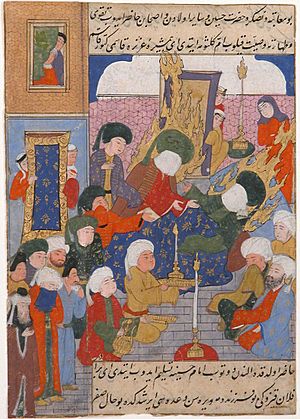
.
Hasan most likely died on April 2, 670 CE. While some sources suggest illness, most early accounts agree that Hasan was poisoned.
Suspicions of Mu'awiya
Mu'awiya is often named as the one who arranged Hasan's murder. Many Shia and some Sunni historians share this view. These reports are sometimes left out by other historians, perhaps to protect the faith of ordinary people. Some early Sunni sources deny the poisoning, saying Hasan died of a disease.
At the time of his abdication, Hasan was about 38 years old, and Mu'awiya was 58. Mu'awiya wanted his son Yazid to be his successor. This would break the peace treaty with Hasan. Therefore, many historians believe Mu'awiya should be suspected in Hasan's death. This removed an obstacle to his son's succession.
Historical Accounts of Poisoning
Hasan did not say who he suspected of poisoning him. He feared the wrong person might be punished. Some Shia and Sunni reports say Hasan's wife, Ja'da bint al-Ash'ath, poisoned him. She was reportedly promised money from Mu'awiya and marriage to his son Yazid. Other accounts suggest different people were involved, but the idea of poisoning at Mu'awiya's instigation is common.
Hasan's Burial
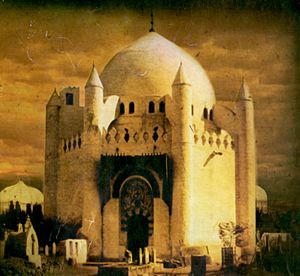
Before he died, Hasan asked his family to bury him next to Muhammad. If they faced trouble, he asked to be buried near his mother in the al-Baqi cemetery. The governor of Medina was not against burying Hasan near Muhammad. However, Marwan I strongly opposed it, saying Uthman was buried in al-Baqi. Muhammad's widow Aisha, who was often seen as against Ali, also joined Marwan in his opposition.
Muhammad's companion Abu Hurayra tried to convince Marwan to allow Hasan's burial next to Muhammad. He reminded Marwan of Muhammad's high regard for Hasan and Husayn. Supporters of Husayn and Marwan gathered with weapons. Muhammad ibn al-Hanafiyya reportedly stepped in and reminded them of Hasan's burial request. Hasan was then buried in al-Baqi. Some accounts say the Umayyads shot arrows at the body during the standoff. Mu'awiya later rewarded Marwan for his stance by making him governor of Medina again. However, Marwan reportedly joined the funeral procession and praised Hasan for his great patience. Hasan's tomb later became a domed shrine. It was destroyed twice by the Wahhabis in 1806 and 1927.
Hasan's Family Life
Hasan had many children. Sources say he had fifteen sons and nine daughters with six wives and some concubines. His first marriage was to Ja'da bint al-Ash'ath, the daughter of a Kinda chief. This marriage was likely to strengthen ties with powerful tribes. Hasan had no children with Ja'da, who is often accused of poisoning him. Umm Bashir was Hasan's second wife. She gave birth to his oldest son Zayd, and two daughters, Umm al-Husayn and Umm al-Hasan.
After he stepped down as caliph and returned to Medina, Hasan married Khawla. She already had children from a previous marriage. Khawla gave birth to Hasan's son, Hasan. Hasan also married Hafsa bint Abd al-Rahman ibn Abi Bakr. He later married Umm Ishaq bint Talha ibn Ubayd Allah, who bore him a son named Talha. Another wife was Hind bint Suhayl ibn Amr. Hasan's other children were likely from concubines. These included Qasim and Abd Allah, both killed in the Battle of Karbala (680). Also, Umm Abd Allah, who married Zayn al-Abidin and became the mother of Muhammad al-Baqir, the fifth Shia Imam. Hasan's descendants are often called sharif.
Some old reports claim Hasan married many women, but historians say these numbers are exaggerated. Hasan's marriages during his father's lifetime were likely for political alliances.
Hasan's Legacy
Appearance and Character
Hasan was said to look very much like Muhammad. He might have also had Muhammad's calm personality. He is described as gentle, generous, and religious. He was known to have made several pilgrimages on foot. Hasan was a good speaker. In contrast, his brother Husayn might have inherited their father Ali's "fighting spirit."
Why Hasan Stepped Down
Some sources that were against Hasan say his peace treaty with Mu'awiya showed weakness. They claimed he always planned to surrender. Others suggest Hasan wanted an easy and luxurious life. Western historians sometimes criticize Hasan for giving up the caliphate.
However, other sources disagree with these criticisms. They say Hasan had no choice but to step down after his army rebelled. They argue Hasan wanted unity and peace among Muslims. Shia historians believe Hasan's abdication was the only realistic choice. This was because the people of Kufa gave weak support, and Mu'awiya's army was much stronger. Sunni sources say Hasan stepped down because he preferred peace and did not want more bloodshed.
Hasan's Place in Islam
Hasan is a member of the ahl al-bayt (Muhammad's family). He also belongs to the ahl al-kisa, which includes Muhammad, Ali, Fatima, and their two sons. All Muslims respect the ahl al-bayt. However, Shias hold them in the highest regard, seeing them as the true leaders of the Muslim community.
Quranic References
The Quran mentions "our sons" in verse 3:61. This is believed to refer to Muhammad's grandsons, Hasan and Husayn. Later, at the mubahala event, Muhammad gathered Ali, Fatima, Hasan, and Husayn under his cloak. He called them his ahl al-bayt. These five are also known as the ahl al-kisa (people of the cloak). Their inclusion in this important event raised the religious standing of Muhammad's family.
The Verse of Purification (33:33) says:
God only desires to remove defilement from you, O ahl al-bayt, and to purify you completely.
Shia Islam limits the ahl al-bayt to Muhammad, Ali, Fatima, Hasan, and Husayn. This verse is seen by Shias as proof that the ahl al-bayt are infallible (perfect).
The Verse of Mawadda (42:23) includes the passage: The word "kinsfolk" (al-qurba) in this verse is understood by Shias to mean the ahl al-bayt: Ali, Fatima, Hasan, and Husayn. Hasan referred to this verse in his first speech as caliph in 661. He said he belonged to the ahl al-bayt, whose love God has made a duty in the Quran.
Verses 76:5-22 are linked to the ahl al-kisa in many Shia and some Sunni sources. These verses were revealed after Ali, Fatima, Hasan, and Husayn gave away their only meal for three days in a row to beggars.
Sunni Islam
In Sunni Islam, the first four caliphs are considered "rightly-guided." Some Sunni scholars also included Hasan as a fifth "rightly-guided" caliph. This was because his six-month rule completed a thirty-year period that Muhammad reportedly predicted for the prophetic succession.
Sunni Muslims explain Hasan's peace treaty with Mu'awiya with a hadith from Muhammad. This hadith reportedly predicted that Hasan would unite two warring Muslim groups. They see the peace treaty as Hasan willingly stepping down from the caliphate. The year of the treaty is called the "year of unity" in many early Sunni sources. In Sunni Islam, a leader can step down if he believes it is best for Muslims. Hasan's abdication was a choice to avoid bloodshed.
Shia Islam
| Part of a series on Shia Islam |
| Twelvers |
|---|
|
Principles
|
|
Other beliefs
|
|
Other practices
|
|
Groups
|
|
Other related sects & groups
|
|
Hadith collections
|
|
|
Related topics
|
Hasan al-Mujtaba (lit. the chosen) is seen by Shias as their second Imam. Even though some followers criticized his abdication, he was still seen as the leader of Ali's supporters until his death. The Shia doctrine of Imamate says that Muhammad was succeeded by Ali, and then by Hasan, through God's command. Shias believe Hasan's authority came from God. This authority was not lost when he stepped down from political power. He only gave up the political rule to Mu'awiya. Shias see the Imamate (spiritual leadership) and Caliphate (political rule) as separate until God makes the Imam victorious. A hadith says Hasan and Husayn were Imams "whether they stand up or sit down" (meaning whether they ruled or not).
Shia scholars explain Hasan's peace with Mu'awiya by pointing to his army falling apart, his allies abandoning him, and the attack on his life. Shias also see Hasan's abdication as an act of taqiya (religious dissimulation). Shia scholars view the treaty as a ceasefire, not an alliance with Mu'awiya. They point to Mu'awiya breaking the treaty, the rule that Mu'awiya should not be called "commander of the faithful," and Hasan's refusal to fight for Mu'awiya.
Miracles
Some miracles are attributed to Hasan. It is said he recited the Quran when he was born and praised God. Later, he reportedly brought a dead man back to life. A dead palm tree bore fruit at his request. God also sent down a meal from the sky for his companions.
Literature and TV
Literature
Persian literature about Hasan falls into two types: historical and mystical. Historical writings cover his life, his time as Imam, his peace with Mu'awiya, and his death. Mystical writings show his good qualities and his important place in Shia spirituality. Hasan's life has been a topic for poets for centuries. Poems focus on his virtues, Muhammad's love for him, and his suffering and death.
Television
The TV series Loneliest Leader (1996) tells Hasan's life story. It covers his peace with Mu'awiya and the state of the Muslim community after his death. Events leading to Hasan's peace and the attempt on his life are also shown in the series Mokhtarnameh. Another Arab series, Muawiya, Hasan and Husayn, has been criticized by some as being against Shia views.
See also
 In Spanish: Hasan ibn Ali para niños
In Spanish: Hasan ibn Ali para niños
- The Fourteen Infallibles
 | Georgia Louise Harris Brown |
 | Julian Abele |
 | Norma Merrick Sklarek |
 | William Sidney Pittman |


